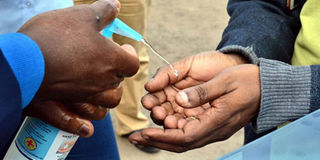State orders use of seized ethanol to make sanitisers

Nairobi residents are pictured using hand sanitiser as part of measures to control spread of the deadly Covid-19, March 14, 2020. PHOTO | FRANCIS NDERITU | NATION MEDIA GROUP
What you need to know:
- The World Health Organisation (WHO) has recommended use of alcohol-based sanitisers to curb spread of the Covid-19 pandemic.
- Head of Public Service Joseph Kinyua instructed members of the multi-agency team putting in place measures against the virus to urgently identify all ethanol held under any offences at ports of entry and customs zones.
In efforts to address the biting shortage of hand sanitisers amid measures to prevent spread of the deadly coronavirus, the Kenya government has ordered use of seized ethanol to manufacture more.
Ethanol is a key component in production of alcoholic drinks and alcohol-based hand sanitisers.
On Thursday, Head of Public Service Joseph Kinyua instructed members of the multi-agency team putting in place measures against the virus to urgently identify all ethanol held under any offences at ports of entry and customs zones.
They are to release it to the Kenya Pipeline Company (KPC), which is expected “to implement an accountability framework to ensure the ethanol is utilised for manufacture and distribution of sanitisers."
“The government is desirous of distributing affordable sanitisers to the general public. To this end, corporations in the oil industry have volunteered to produce alcohol-based sanitizers for distribution for free to the general public,” Mr Kinyua said
“KPC will liaise with the oil industry players, who have expressed willingness to produce the sanitisers, for the expedited manufacture and distribution.”
ACCOUNTABILITY
The World Health Organisation (WHO) has recommended use of alcohol-based sanitisers to curb spread of the Covid-19 pandemic.
So far, Kenya has confirmed seven cases of the disease. Health Cabinet Secretary Mutahi Kagwe said all the cases are imported.
Mr Kinyua addressed the letter to Kenya Revenue Authority Commissioner-General James Mburu, National Environmental Management Agency (Nema) Managing Director Mamo Mamo, Director of Public Health Patrick Amoth and Director of Criminal Investigations (DCI) George Kinoti.
The directive was also sent to Kenya Ports Authority (KPA) Managing Director Daniel Manduku, the Kenya Bureau of Standards (KEBS) Managing Director Lt-Col (Rtd) Bernard Njiraini, Ethics and Anti-Corruption Commission (EACC) Chief Executive Twalib Mbarak and KPC Managing Director Macharia Irungu.
In 2015, the KRA issued a public notice introducing procedures to govern access, purchase and importation of ethanol pursuant to the government’s initiative to combat illicit production and consumption of spirits.
The multi-agency team said there are thousands of litres of impounded ethanol in various government stores.




